Scroll down for how to subscribe, transcript, and more
This is a special bonus episode of the Lean Blog Interviews Podcast.
It's a freeform group discussion with James P. (Jim) Womack, Katie Anderson, Jamie V Parker, and Mark Graban, recorded live as a crew was tearing down the room after the event we were all invited to attend on September 6th: The Lean Mindset event that was organized and hosted by GE.
Together, the four of us had the opportunity to dissect and discuss the ideas that we were exposed to during the course of the day. Our observations can provide fascinating insights for everyone seeking to learn and apply the Lean Mindset.
One key aspect that repeatedly resonated with the four was the fundamental belief — articulated with vulnerability — that things could improve. This principle forms the foundation of Lean thinking, emphasizing that progress is not just about achieving better results, but about an unwavering belief in continual improvement.
This idea of continuous improvement was coupled with another critical perspective — the acceptance of failure as a part of the journey, rather than a deterrent. The Japanese concept of ‘fall down seven times, get up eight' perfectly encapsulates this notion. Embracing failure as a fundamental part of learning, rather than penalizing or fearing it, steers the course toward sustainable improvement.
All these principles reaffirm the Lean Mindset's focus on continuous improvement and learning from struggles, fostering a culture that embraces challenges to grow and succeed. But the journey isn't always easy, as pointed out by Carol Dweck, Professor at Stanford and author of Mindset — the journey is filled with struggles, but anything meaningful comes with the struggle that we must learn to acknowledge, accept, and use as stepping stones to success.
There's more to come from me, Katie, and Jamie about the day.
- Jamie's podcast is “Lean Leadership for Ops Managers.“
- Katie's new podcast is called “Chain of Learning” — Coming soon.
The podcast is sponsored by Stiles Associates, now in its 30th year of business. They are the go-to Lean recruiting firm serving the manufacturing, private equity, and healthcare industries. Learn more.
This podcast was also brought to you by Arena, a PTC Business. Arena is the proven market leader in Cloud Product Lifecycle Management (PLM) with over 1,400 customers worldwide. Visit the link arenasolutions.com/lean to learn more about how Arena can help speed product releases with one connected system.
This podcast is part of the #LeanCommunicators network.

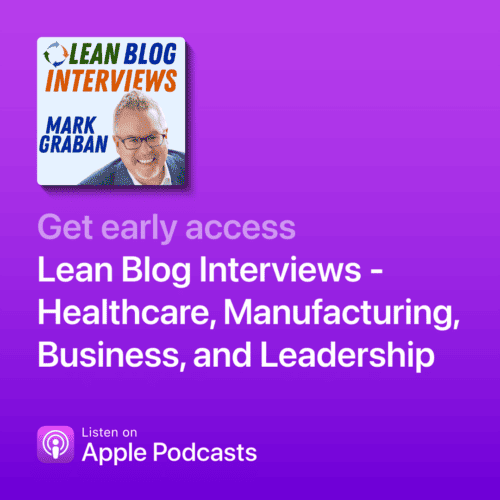
Videos From the GE Event:
Thanks for listening or watching!
This podcast is part of the Lean Communicators network — check it out!

Automated Transcript (Not Guaranteed to be Defect Free)
Mark Graban: Hi, this is Mark Graban and this is a bonus episode that was recorded the afternoon of September 6, immediately after an event called The GE Lean Mindset. I was invited to attend in person, so thank you to GE for that. As were Katie Anderson, Jamie V. Parker, and Jim Womack. So the four of us here had a chance to discuss what we heard that day.
Mark Graban: There's some background noise from the event staff tearing down the event. I've done my best to edit that out, but my apologies for any noise that remains. The recordings of the day's live-streamed sessions can be found on the GE YouTube channel as a playlist for the GE Lean Mindset event. You can find them on my website via LeanBlog.org/leanmindset or look for a link in the show notes. Well, hi, this is Mark Graban and we are doing a debrief immediately after the GE Lean Mindset event that was held today.
Mark Graban: Maybe everyone else around the table can introduce themselves.
Katie Anderson: I'm Katie Anderson, I'm thrilled to be here.
Jim Womack: Jim Womack, founder of the Lean Enterprise Institute a long time ago and happy to be here.
Jamie V. Parker: Jamie V. Parker. And, you know, it's hard to even say what I do these days, but definitely engaged in this conversation, for sure.
Katie Anderson: Absolutely. And it was exciting that both well, three of our books, Jim's, Mark's and mine, were all on the bookshelf today here at The Lean Mindset event. And hopefully that many people will continue to learn from them as we go on.
Those Three Books
- Lean Thinking (Womack)
- Learning to Lead, Leading to Learn (Anderson)
- The Mistakes That Make Us (Graban)
Other books that were given to attendees
Mark Graban: So, as an example of the cross-pollination of industries and thinkers and people here today, it struck me earlier, Chef Wolfgang Puck, who had just been up on stage sharing his thoughts on continuous improvement, was carrying a copy of George Koenigsaecker's Leading the Lean Enterprise, I believe is the title of the book. So something I didn't think I would ever see, but I was happy to see it.
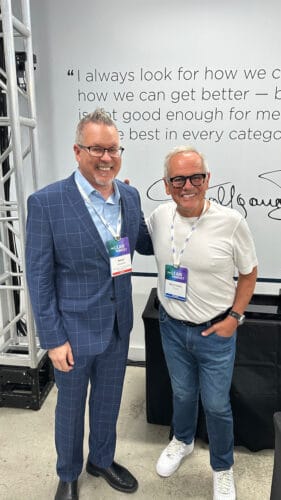
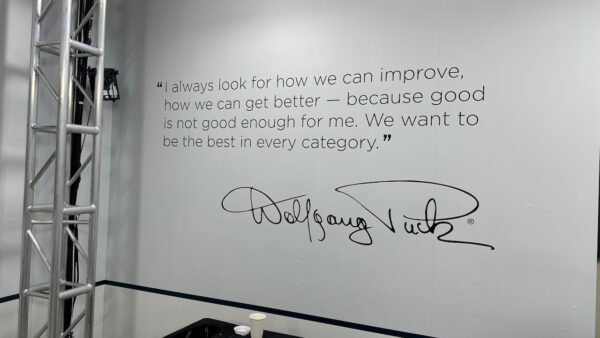
Jamie V. Parker: Yeah, definitely. Well, I would love to maybe have a little conversation here about some of the themes that we heard woven in through different speakers and experiences and what some of those takeaways are. So maybe we can kick it off. And I would say I would start it off with a conversation about the Lean Mindset. Right.
Jamie V. Parker: That is the name of the event. And definitely one of the things that I heard over and over was this fundamental belief with vulnerability shown and displayed, is that things can be better. So not just, yeah, technically we can get better results or achievements, but at the core, things can be better, we can improve. Because it's almost like the foundation. You have to believe that if you really want to go after it.
Katie Anderson: Absolutely. And I think we heard the word continuous improvement throughout the day and then coupled with that was willingness to learn from failure and accepting that failure was part of the journey. And I brought several Daruma dolls and it makes me think about the fall down seven times, get up eight. The failure is the part of the journey and the embracing of that as fundamental and foundational to continuous improvement.
Jim Womack: What I found interesting about the day was that GE was first introduced to lean thinking, if you will, in the late 1980s by Shingijutsu, the Japanese ex Toyota consultants. And talk about falling down and getting up and falling down and getting up. Wow. These guys historically have done a lot of falling down and some getting up. And now we have the chairman who has just finished dealing with the decongglomeration and dealing with the debt problem at GE, who says our path ahead is that we're going to create a lean enterprise based on a lean mindset.
Jim Womack: Well, that's actually a big deal because this really was, along with General Motors, the iconic modern management company from the 1920s. As recently as the 90s, GE was thought to have the best management system in the world. Partly they kept saying that, but a lot of people believe that. And then, goodness, they just went right over the falls. So here we are on the far side of the falls getting up again. And so I found that I think, a very positive thing for the lean movement, that this is not what you would expect the head of GE to say over the last 20 or 25 years.
Jim Womack: And by the way, they were doing lots of Kaizen. They had an Opex team they were doing doing, but it really was disconnected from the fundamental mindset of the company, which was the old-fashioned sort of modern management. Make your numbers. That's what counts. So this is actually news.
Jim Womack: This is actually news. You go to a lot of conferences that aren't news. This is actually news. It turns out that the man really did bite the dog and we should all pay attention. And the man, by the way, in this case is Larry Culp.
Jim Womack: But the issue is whether in the time that he has left, because he's been at it for a while, can create a management system that is A, lean and B, sustainable. Okay? It's easy to have lean for a moment, nanosecond lean. It's hard to be both lean and sustainable. And boy, I'm rooting for them.
Jim Womack: I was delighted to be here. I was delighted to hear Larry's sort of characterization of where they are, where they need to go, and then all these other interesting people who are doing all kinds of I think to me.
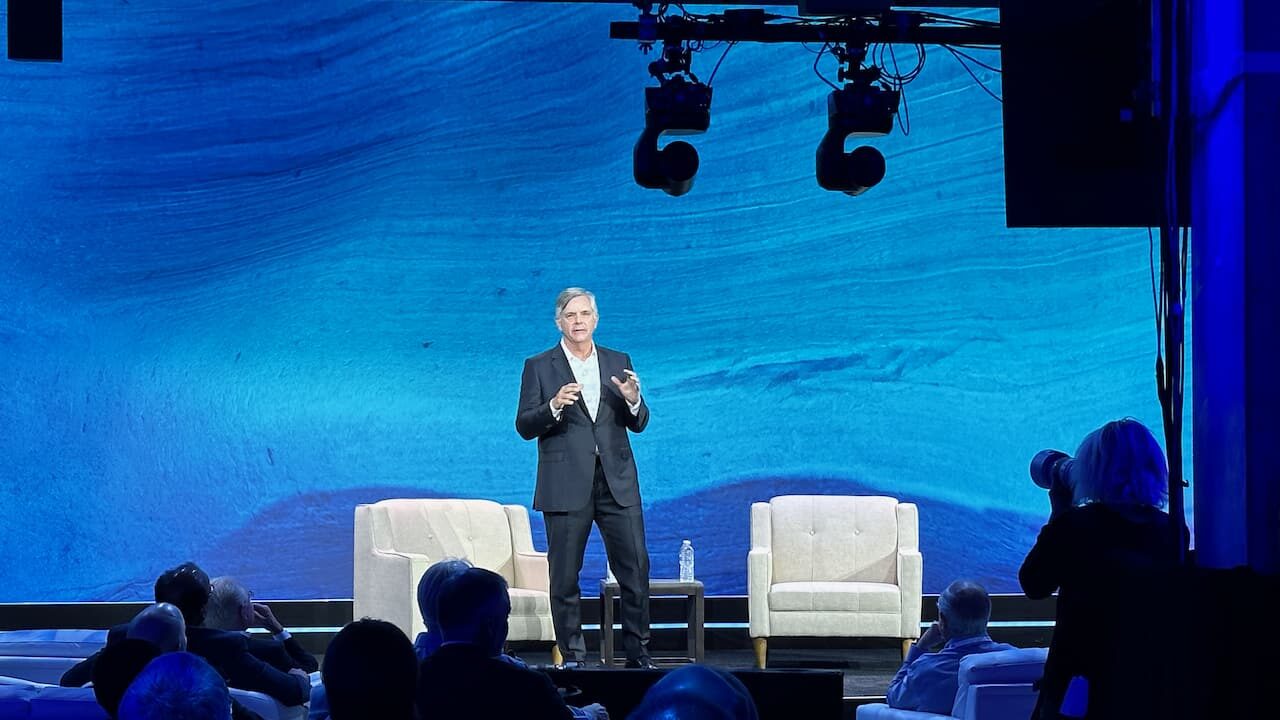
Mark Graban: One of those interesting people was Jim Farley, who joined via video from Dearborn, where he's dealing with the latest contract negotiations. So he wasn't able to be here in person, but I really appreciated what he shared. And Jim, when you were talking about GE, learned about lean concepts a long time ago. So did Ford. I know they were taking trips to Japan with the UAW in the 1980s to go and see and learn.
Mark Graban: And Jim Farley I think characterized that they're fairly early in their lean journey. He might be the fourth consecutive CEO to be saying that. So it's interesting of, well, what would be different this time? Will it be deeper and more sustainable with his background from Toyota?
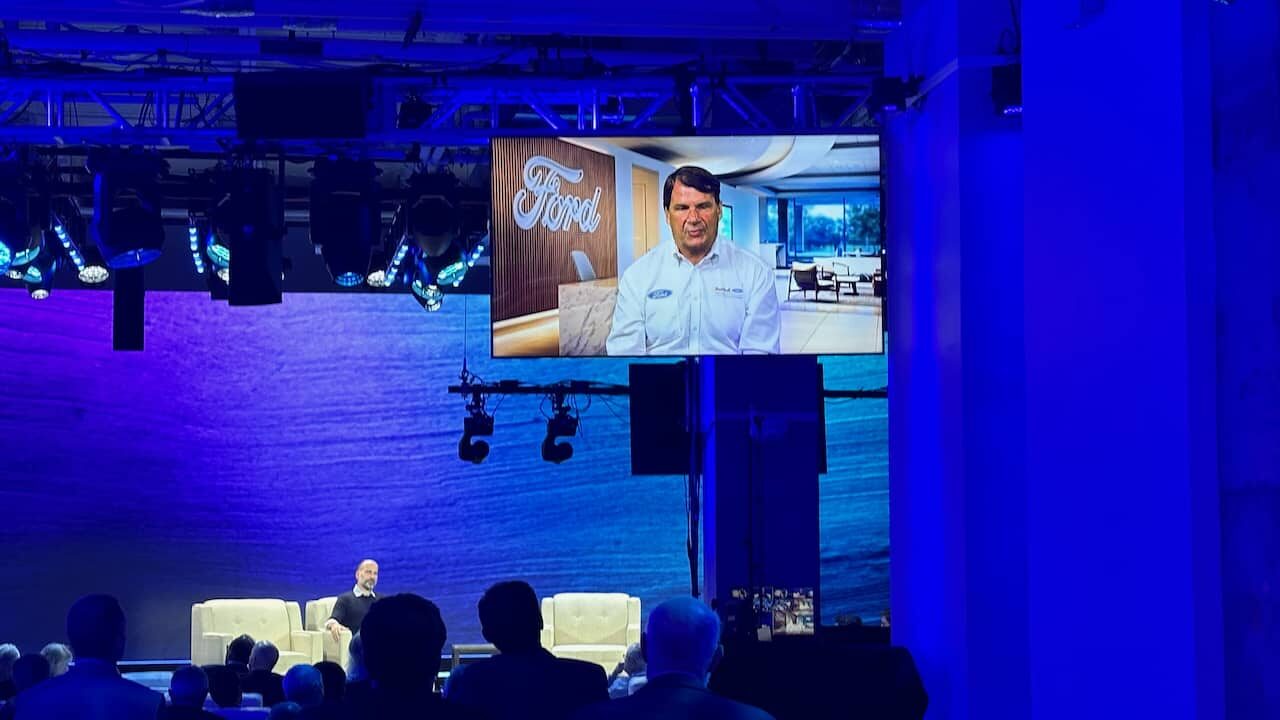
Katie Anderson: Absolutely. So are they learning from the failures or the things that have not yet worked and what are they doing differently this time?
Jim Womack: Yeah, well, when we wrote The Machine That Changed the World book, which is now 33 years ago, we were actually quite complimentary about Ford that they had really done some things and the thought was that they were just getting started but they could really continue and then poof, just fell apart. Lots of lean actions, no lean mindset, no management mindset reverted to the traditional Ford thing, which was kind of Ford's imitation of GM as a management system. So then they bumped along, they bumped along, they went through CEOs, they got Alan Mullaly and Alan was a good guy and Jim Morgan helped him figure out the product development system and off they went and suddenly they're looking good. And then Alan said, gosh, I'm getting old and we're here at the top of the game. I think I'm going to go play tennis or whatever and what do you know?
Jim Womack: So that many of the problems Ford's had in the last couple of years are, if you will, failure to launch. They're late, they're over budget and they got big problems and that was all stuff that it looked like they had actually kind of got a grip on 10, 15 years ago. So here we are, another case of is it sustainable? And Jim is an interesting guy, that he was a sales guy at Ford, at Toyota, and there was the Lexus kind of brand guy and he's the guy who's now trying to bring a process focus from what's typically the least process focused part of a business, the salespeople. So let's all wish him luck.
Jim Womack: It's not just the UAW agreement in the next couple of weeks, but it's the situation they're trying to transform from one industrial technology paradigm to another. It takes a lot of money. They've recently been making some money. Union looks at it and says, wait a minute, that's our money. Management looks at it and says, we can't make this transition except from internal profits because no one's going to loan us enough money to really do this.
Jim Womack: And then Elon Musk of course is just laughing and says, gee, I think I'll just cut the cost by 30% and just watch the fun. And by the way, he would be willing to sacrifice short-term profits. He doesn't have anybody who's really threatening him. So this is a very tough time, a really good time to be really lean, but we will see whether they can be really sustainably mean.
Mark Graban: One thing Jim Farley said was, Lean is such a big bet for us. It's non-negotiable. And this might be different than some of the approach taken before. He talked about really evaluating their top 500 leaders. There are certain behaviors you need to model, probably building upon what Alan Malali started around celebrating Red, or at least admitting, you know, basically, okay, this is non-negotiable.
Mark Graban: You cannot or will not lead this way. We will show you a way out the door. It'd be interesting to see what effect.
Jim Womack: It was non-negotiable under Alan as well, just to be noted. So, look, hey, bless the guy. Good luck. We all need some CEOs to do the right thing in a sustainable way, so I'm rooting for him. It's just saying this is a tough game.
Katie Anderson: Well, it speaks to how challenging it is to really change not just mindset, but behavior, because our habits are so ingrained in what's led to earlier success. That's a hard shift for a lot of leaders at all levels to make as well, especially in a time of crisis or feeling the pressure externally.
Mark Graban: And I think speaking of crisis, one of the other leaders who was here today, Patti Poppe, who had roots in the auto industry in Michigan, then with an energy company and became CEO of PG&E in the aftermath of their disasters and California wildfires and lawsuits. And she referred to Lean as their turnaround recovery, like, not as a financial turnaround, but an operational turnaround, and shared some really compelling examples of using A3 problem solving to really dramatically reduce the number of fires being started and applying. I think she described it like they're not just doing a lot of problem-solving training in some theoretical way, they're applying what they're trying to get better at to their most meaningful problems for them and people in California.
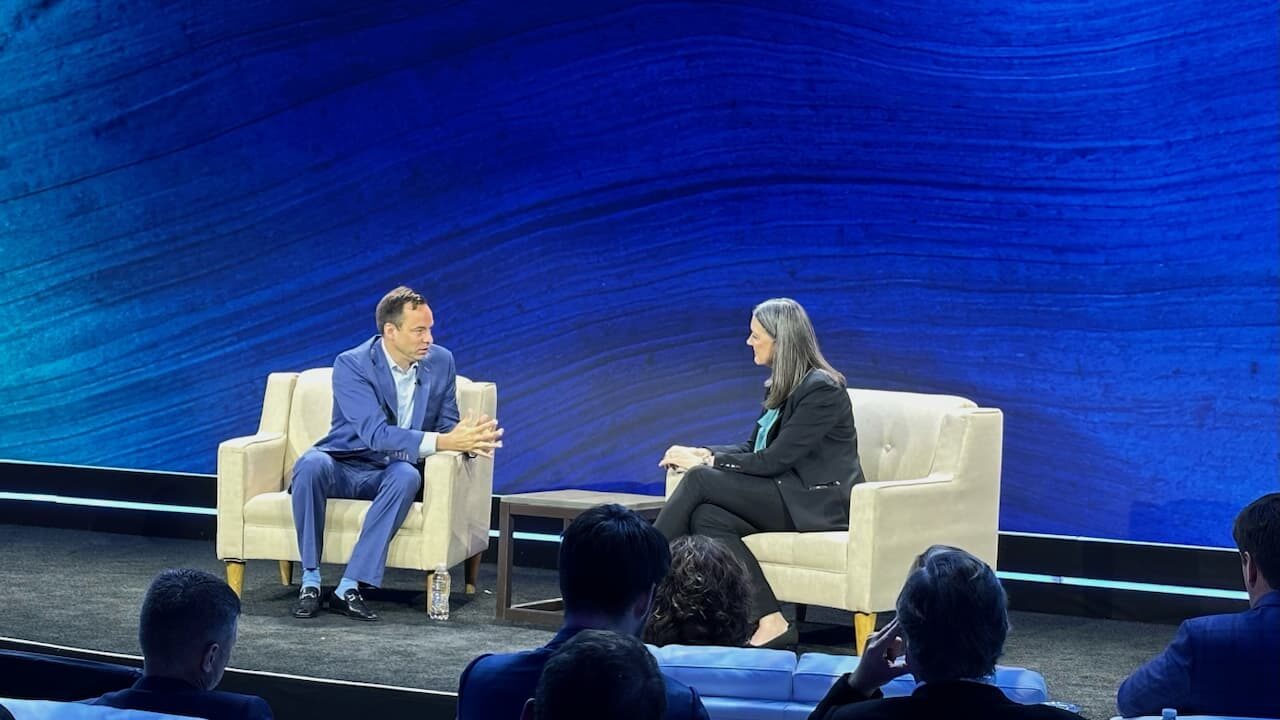
Jim Womack: I was struck by the long shadow of the car industry on this Lean thing. Of course, from the very beginning, she spent 15 years at GM, was a very successful manager at a time that GM was just trying and trying to get in gear. But she learned a whole lot of Lean lessons. And then circumstance was her friend, because if PG&E hadn't augered in, they wouldn't have been looking for a CEO. And suddenly here she was at a time of crisis.
Jim Womack: So people are going to pay attention and it's a terrible crisis. They're burning down the, you know, how much crisis do you need? Boy, I thought she made a terrifically persuasive case, though, for what she's trying to do. I put her in the new category of Lean people worth listening to because I really didn't know her story and knew vaguely that she'd been at GM, but I thought, wow, here is somebody who really has picked up the thread. Speaking of threads and warp and weft and so forth.
Jim Womack: That's fantastic. I am so delighted that it is still reappearing in different places with different manifestations, but there's still life to it.
Jamie V. Parker: One of the things that I thought was really interesting too, about when Patty was sharing and she told a story and some significant savings and things through problem-solving, there was this absolute kind of overarching idea, which is that we do important work here, and recognizing for all of the employees out in the field working, that there's a connection. So it's not just this problem solving to make this business better, but they're recognizing that, hey, when we improve, when we solve problems, when we make things better, it's going to make energy more affordable for our neighbors, it's going to prevent fires, it's going to save lives. And it really felt like there was a really strong connection to purpose. And I guess just the contributions the teams were making.
Katie Anderson: Absolutely. She talked about love at work and that was about how the connection to purpose, it's not just improving process, but how do we have a real human connection? That's what I took away from her on that.
Jim Womack: You know, the audience all gasped, particularly all the guys. Love at work. We thought we were told, you can't anyway. But I think she meant something different. But look, what was interesting about her gimba was that and by the way, it does feel like many people just fundamentally don't understand this.
Jim Womack: The CEO goes and does gemba. What she was doing was acknowledging their contribution, their humanity. She wasn't there telling them what to do. I've been on lots of gemba with CEOs who just took tremendous pleasure in on the spot solving somebody's problem five levels down. This should be illegal.
Jim Womack: No CEO should be allowed to do that. To go around and give everybody a hug and say, what you're doing is actually important for civilization, which is what she said, and I'm with you, and I'm going to try to enable you. By the way, what else do you think you need to do that's just very different from the old top-down command and control CEO who goes around shouting, absolutely.
Katie Anderson: And they've created the structure to enable executives and leaders to go to know Mondays are the day that they go out to the field. It's field day. And I've worked in some other organizations where we created that structure that facilitated leaders to get out to Gemba, because one of the barriers is the packed schedule. So there might be a desire there. So how do we create those systems and structures that support those very behaviors that we need?
Jamie V. Parker: Right.
Jim Womack: And what Lisa Yerian was talking about at the Cleveland Clinic was that every morning there is sacred time at the team level. Don't bother me from seven to 715. No meetings, no interruptions. Our team is just going to say, what went wrong yesterday? How are we going to prevent it from happening today?
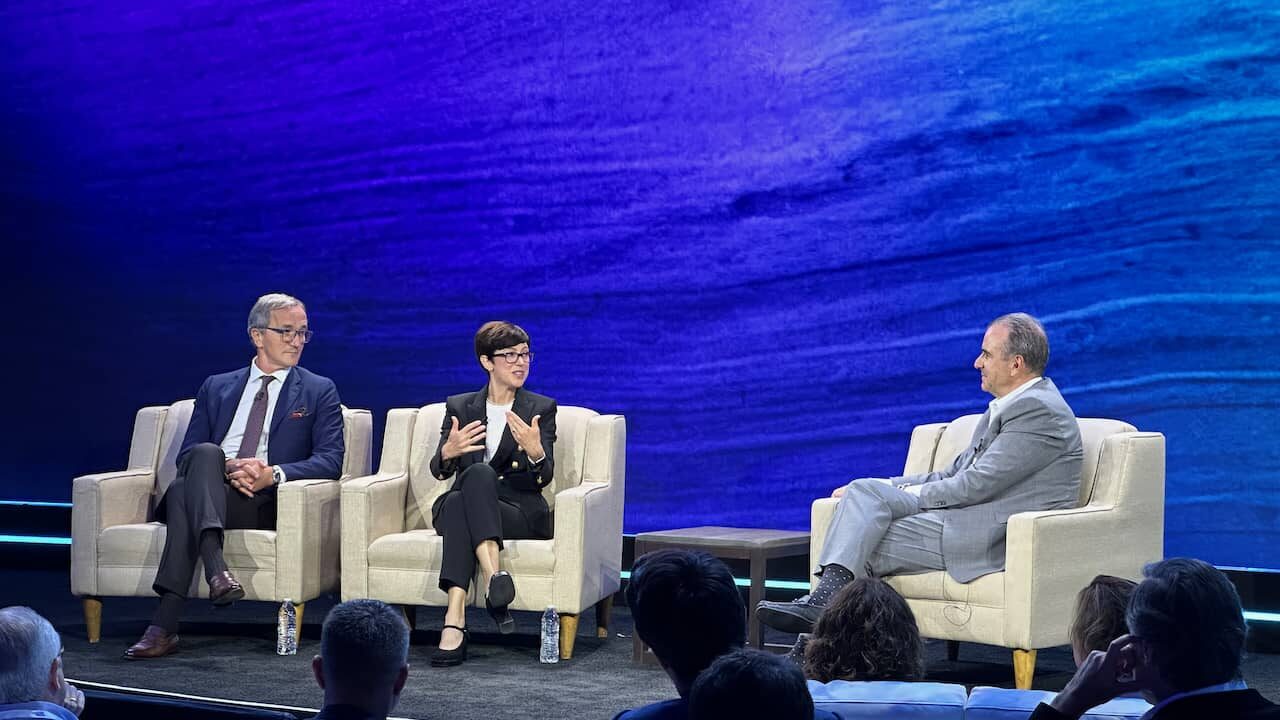
Jim Womack: And then it escalates up. And finally you get to the CEO at 10:00 in the morning, who, by the way, has penciled in. I need 15 minutes to deal with those issues that have been escalated all the way to the top. Wow. That means don't do your email, don't be on the far side of the world, don't whatever.
Jim Womack: Because there's all this important stuff, of course, that you need to be doing. But instead you have a time for all to share their struggles, their problems, to suggest their own countermeasures, and then all they need is for that senior leader sometimes to say, okay, it sounds like you've really done a good job, go with it. Or sometimes you have to say, well, we have to study it some more. But still, that's different from what most companies have worked.
Mark Graban: I'm going to connect the dot from the word struggle back to something that Carol Dweck shared with us. Author of the book Mindset, Stanford professor who is here today. And she shared the idea that people at work should share their struggles, that it really helps transform a culture from that fixed mindset to a growth mindset of acknowledging whether we're using words like mistakes or failures. That came up a lot today. The word struggles came up.
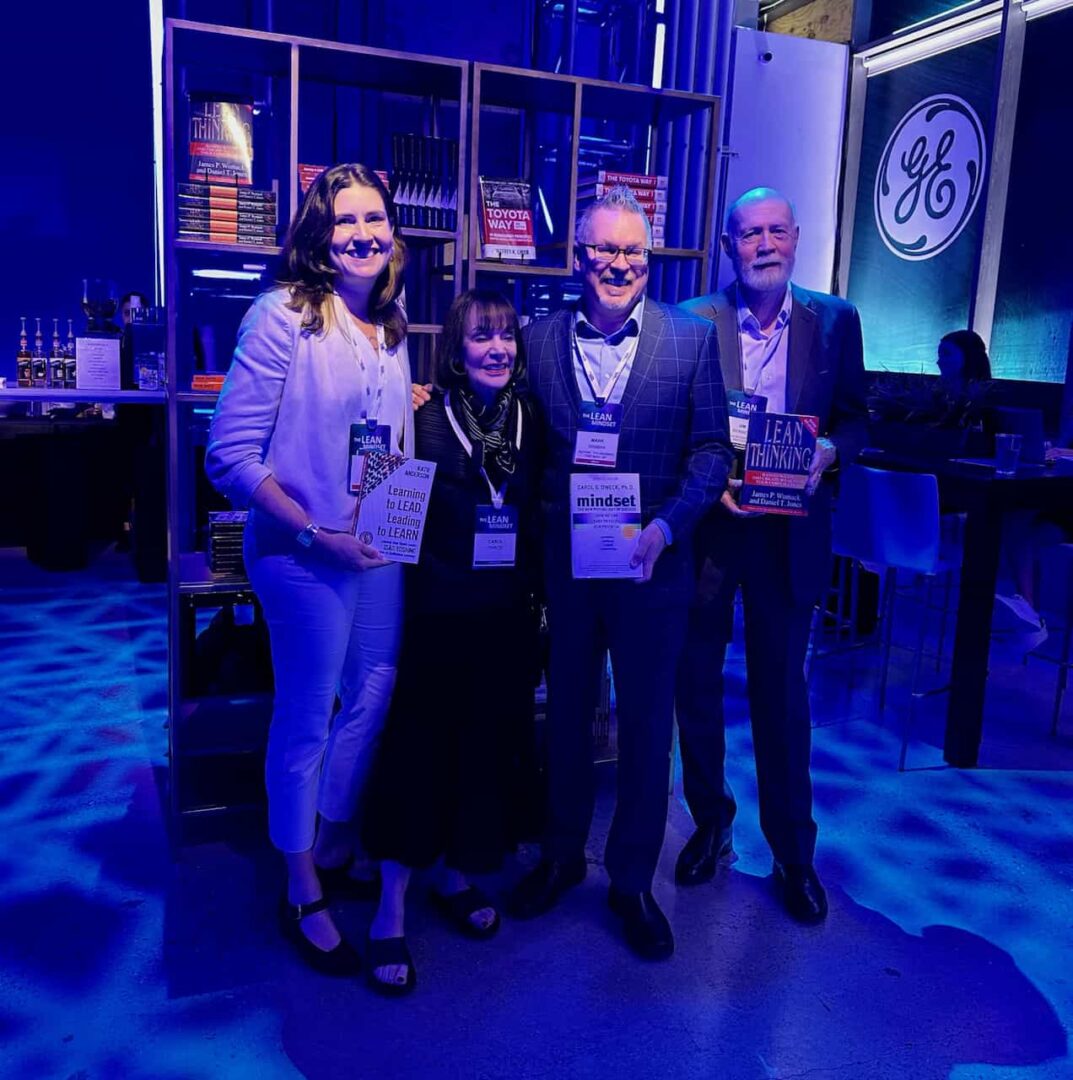
Mark Graban: And just to acknowledge that anything meaningful comes with struggle and we shouldn't ignore that. We shouldn't be afraid to bring it up. And I think that was one theme back to everybody, including Giannis Antetokounmpo from the Milwaukee Bucks, basically articulating his own growth mindset. So I just love seeing those different threads coming up throughout the day.
Katie Anderson: And sharing your own struggles connects back to the humility, right? So it can't just be the leader executive saying, we shall be lean now, but what does that really mean on an individual level? And how do leaders embody those same behaviors and mindsets that they're asking others to do that? And starting with your own struggles is not easy way. Because it may not be easy but one accelerant to creating that culture where it's okay to bring up the failures and ask for reds.
Katie Anderson: Because if you're sharing that yourself.
Jim Womack: But look, the first time that someone brings up something and they get shot is the last time that anybody will bring up something. Okay? And look, it's so easy. Many of these imagine PG E, the forest is on fire and it's our fault. And somebody stands up and says, you know, this is our fault.
Jim Womack: Whoa, whoa, wait a minute, this is real. We're going to go to jail. And so easy for the leader to suppress that and to say, well, you didn't have to bring that problem up. Did you have to bring that up? Okay, so therefore it takes a long, long time to build up the credibility that struggles are going to be embraced, that mistakes are going to be analyzed and used for learning as opposed for punishment or ridicule or whatever.
Jim Womack: And I don't know what the half-life of a good act versus the half-life of a bad act is. But certainly in the case of penalizing someone for having spoken the truth, having pointed out the issue about the elephant in the room that no one else want to talk about, it's a long time to recover if you do that. So let us hope that we all basically can agree with that.
Jamie V. Parker: Yeah, and I think, too, sometimes we think on this one side, there's the penalizing or kind of that type of reaction, but there's also this middle ground neutral or what. We think we're trying to create the space where people can talk about it, but we jump in and give the answer, well, you can just do this and that actually can have that same negative effect here, because I'm bringing up this struggle. And it's not that there's empathy. It's not that there's space for me to work through this struggle as much as you're almost downplaying the struggle, oh, just do this, and it's not a problem. And that can actually depress future struggle sharing as well.
Katie Anderson: Well, absolutely. So that listening and then the providing the empathy, which several of the speakers talked about today, is like, how do you show up in that empathetic way without jumping in?
Jamie V. Parker: And I think Dara even talked about listening and how we probably don't do enough to get better at listening. I think classes like, oh, you can do all the MBA classes on these. Where do you learn how to listen effectively?
Katie Anderson: There's so many reflections. My brain is just full from this day of dynamic and insightful leaders sharing reflections. And I suppose that's another component of so many people talk today, the importance of reflection and studying. And that that's the critical.
Jim Womack: I thought there was another piece that no one ever said anything about, but Larry Culp is a guy who loves to have a conversation. It's really interesting. I mean, this guy's, the CEO of a very big company, has done some super heavy lifting, and I've talked with him about other things. And you think, wow, what's so unusual? He actually enjoys listening.
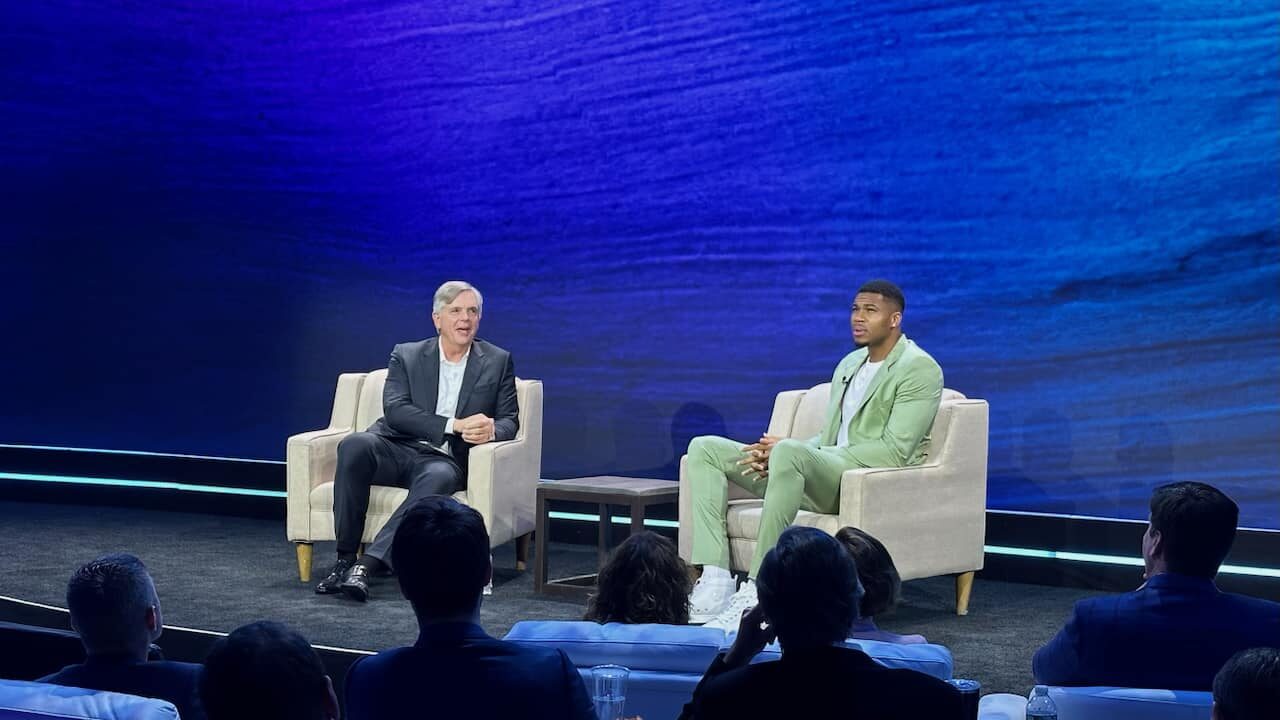
Jim Womack: Whoa, what's wrong with this guy? How did he ever get anywhere? And that's all of our the leader is supposed to have the answer, and then let's just have a conversation. It doesn't have to be so totally structured. We don't have to look at our watches all the time.
Jim Womack: You say, Gee, what are your struggles? Well, tell me about it. And okay, I've got the answer. No, don't have the answer, but say, how can I help? So I was very impressed with the fact that he's a good listener, that he actually likes to have a real conversation, and he didn't give anybody the answer to anything.
Jim Womack: Whoa, I'll take that.
Katie Anderson: When I had a fireside chat with Larry at the AME conference last year, I asked him about some of the big changes he had to make to become a more effective leader. And he said he had to toss out everything that he learned in his MBA program, and it was to learn to ask better questions and to listen and then to go see. And so those very same things that we're talking about, it's clear he has a natural desire to connect with people, and he's put a lot of practice into those questions and listening. And so he's the right one to be leading this change. He's really modeling that way.
Mark Graban: So this is the immediate post-game show. People might be able to hear as things are being taken apart and moved.
Katie Anderson: We're in the space.
Mark Graban: We'll have the opportunity. I know on my way home, I'm going to have a better opportunity to reflect and go through all the things that were shared today and these common themes, and we can get together and talk about there's so much more we could recount.
Katie Anderson: But my brain is totally the one thing that I'll leave everyone with is the same thing that Carol Dweck left us with was the challenge to do something that the person we want to be would do. So even if it feels like something we're uncomfortable with or a little scared by, just go step into that, because it's through that that you will become that person you want to be. And I thought that that was a really good challenge to all of us.
Jim Womack: Model. Your channel, your Mr. Yoshino.
Katie Anderson: That's true. Model the way to continuous learning.
Jim Womack: He really stepped into what he wanted to be, and that's not easy. Seems so obvious, but how many of us really do that?
Katie Anderson: And a lot of struggle along the way.
Jim Womack: Struggle along the way.
Katie Anderson: And perseverance and patience.
Jim Womack: People mostly don't put in books.
Katie Anderson: That's right.
Jim Womack: Here's something I tried. It was a total failure. Here's what I learned.
Katie Anderson: Well and even for Mr. Yoshino, talking about failure was hard when he got to the know, getting down into the emotional aspect. And so for us to be able to be vulnerable in trusting relationships, it can be so powerful on the night to be able to learn from each other's failures and struggles. As he says, there is no failure if you learn from it. So I think that was echoed today as well.
Mark Graban: Yep. Giannis said there was no failure, only learning, only stepping stones to success. But I think one other reflection I had, though, from going back and rewatching the video and hearing his conversation with Larry, I think there's a distinction between I think it'd be okay to say I failed. Depends on what your expectation was and is there a gap? It's different than being called a failure.
Mark Graban: Right. So, I mean, that maybe comes back to, let's say, unhelpful fixed mindset of I am a failure, as opposed to we failed, but we're going to keep moving forward and keep trying and moving forward. And I think that's just really powerful. As you said, not even Michael Jordan won the championship every year. NBA is incredibly competitive.
Mark Graban: So I think there's a story around resiliency of getting knocked down, bouncing back up and spending the offseason training even harder to prepare for that next season. I really admire that.
Jamie V. Parker: Yeah, I think you said we didn't hit the goal, but we're not a failure. Yes, something like that. Right.
Katie Anderson: Well, the fixed mindset is you are the thing versus the process. And I loved you also said every year I'm like trying to get back on the team. If you always think that you're the best, then you're never going to keep improving.
Jim Womack: Yeah, but look, the generalized thing to take away here at the end, you look at our lean movement and you could say we've had a fair bit of failure. And today I thought was a real bounce-back day. Okay, here's an important guy doing important work and some other important people doing important work and talking in a way that we approve of and we have another chance to get people to listen. So let us learn from our failures here. We have the bounce-back moment.
Jim Womack: Let's see what we can do here in the second half or wherever we are in the game. And just keep on moving, keep on.
Mark Graban: Keeping on, as I've heard you advise.
Katie Anderson: Many times, Jim, keep on trying and continuously improving and learning from our failures and successes. Those are great words to end our immediate post. The Lean Mindset debrief with Jamie Parker, Jim Womack, Mark Graban and myself, Katie Anderson.
Mark Graban: Thank you to GE for inviting us all to the event, the GE Lean Mindset. Again, look for a link to the videos in the show notes or you can go to www.leanblog.org/leanmindset.
What do you think? Please scroll down (or click) to post a comment. Or please share the post with your thoughts on LinkedIn – and follow me or connect with me there.
Did you like this post? Make sure you don't miss a post or podcast — Subscribe to get notified about posts via email daily or weekly.
Check out my latest book, The Mistakes That Make Us: Cultivating a Culture of Learning and Innovation:



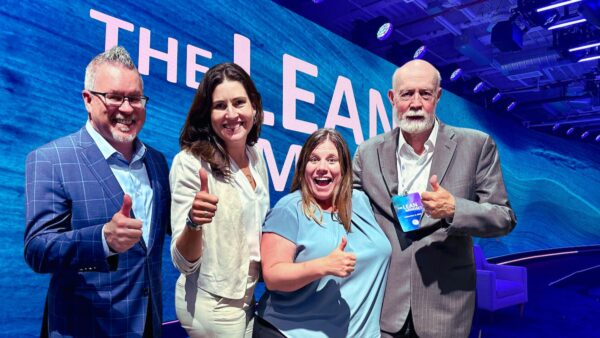
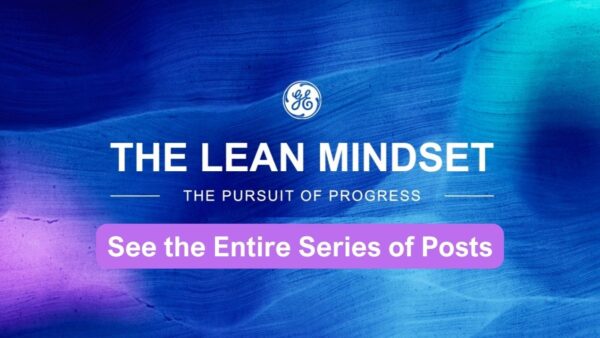







You can also check out a podcast that Jamie V. Parker did with some reflections on the event:
[…] Mark Graban, Jamie Parker, Jim Womack and I gathered together for an immediate post-event discussion (followed by some non-recorded discussions at a restaurant around the corner….which I’ll talk about in upcoming posts and the Chain of Learning podcast), which we have released on Mark’s The Lean Blog Podcast. […]
Please also see Katie Anderson’s post and summary:
Highlights from GE’s “The Lean Mindset”
And a video that Katie posted with some reflections:
[…] Listen to Katie’s discussion with Jamie Parker, Mark Graban, and Jim Womack about GE’s The Lean Mindset event […]
[…] Listen to my discussion with Jamie Parker, Mark Graban, and Jim Womack about GE’s The Lean Mindset event […]
[…] Listen to the discussion with Jim Womack, Jamie V Parker, Mark Graban and myself where we discussed the GE Lean Mi… […]
[…] Listen to highlights from the GE Lean Mindset Event where we talked about the power of lean on Mark Graban’s podcast: Discussing the GE Lean Mindset Event with Jim Womack, Katie Anderson, and Jamie V. Parker […]